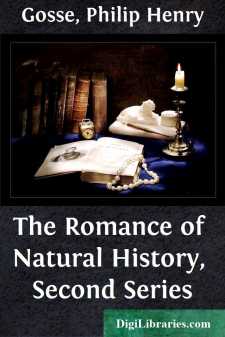Categories
- Antiques & Collectibles 13
- Architecture 36
- Art 48
- Bibles 22
- Biography & Autobiography 813
- Body, Mind & Spirit 142
- Business & Economics 28
- Children's Books 17
- Children's Fiction 14
- Computers 4
- Cooking 94
- Crafts & Hobbies 4
- Drama 346
- Education 46
- Family & Relationships 57
- Fiction 11829
- Games 19
- Gardening 17
- Health & Fitness 34
- History 1377
- House & Home 1
- Humor 147
- Juvenile Fiction 1873
- Juvenile Nonfiction 202
- Language Arts & Disciplines 88
- Law 16
- Literary Collections 686
- Literary Criticism 179
- Mathematics 13
- Medical 41
- Music 40
- Nature 179
- Non-Classifiable 1768
- Performing Arts 7
- Periodicals 1453
- Philosophy 64
- Photography 2
- Poetry 896
- Political Science 203
- Psychology 42
- Reference 154
- Religion 513
- Science 126
- Self-Help 84
- Social Science 81
- Sports & Recreation 34
- Study Aids 3
- Technology & Engineering 59
- Transportation 23
- Travel 463
- True Crime 29
The Romance of Natural History, Second Series
Description:
Excerpt
THE EXTINCT.
If it is a scene of painful interest, as surely it is to a well-constituted mind, to stand by and watch the death-struggles of one of the nobler brutes,—a dog or an elephant, for example,—to mark the failing strength, the convulsive throes, the appealing looks, the sobs and sighs, the rattling breath, the glazing eye, the stiffening limbs—how much more exciting is the interest with which we watch the passing away of a dying species. For species have their appointed periods as well as individuals: viewed in the infinite mind of God, the Creator, from the standpoint of eternity, each form, each race, had its proper duration assigned to it—a duration which, doubtless, varied in the different species as greatly as that assigned to the life of one individual animal differs from that assigned to the life of another. As the elephant or the eagle may survive for centuries, while the horse and the dog scarcely reach to twenty years, and multitudes of insects are born and die within a few weeks, so one species may have assigned to its life, for aught I know, a hundred thousand years as its normal period, and another not more than a thousand. If creation was, with respect to the species, what I have elsewhere proved it was with respect to the individual,—a violent irruption into the cycle of life—then we may well conceive this to have taken place at very varying relative periods in the life-history of the different species;—that is to say, that at a given date, (viz., that of creation) one species might be just completing, ideally, its allotted course, another just commencing, and a third attaining its meridian.
Certain it is, that not a few species of animals have died during the present constitution of things. Races, which we know on indubitable evidence to have existed during the dominion of man, have died out, have become extinct, so that not a single individual survives. The entire totality of individuals which constituted the species, have, in these cases, ceased to be. Some of these seem to have died at a very early era of human history; but others at a comparatively recent period, and some even within our own times. Even within the last twenty years several animals have been taken, of which it is highly probable that not a single representative remains on the earth; while there are others yet again, which we know to be reduced to a paucity so extreme, that their extinction can scarcely be delayed more than a few years at most. Thus we may consider ourselves as standing by the dying-beds of these creatures, with the consciousness that we shall soon see them no more; that the sentence is gone forth against them; that their sands are running to the last grains, and that no effort of ours can materially prolong their existence. The facts from which these conclusions are drawn are highly curious, and I shall endeavour to lay them, with as much brevity as they will allow, before my readers.
On that prochronic hypothesis, by which alone, as I conceive, the facts revealed by geological investigation can be reconciled with the unerring statements of Scripture,—every word of which is truth, the truth of a "God that cannot lie,"—we may assume the actual creation of this earth to have taken place at that period which is geologically known as the later Tertiary Era, or thereabout....


